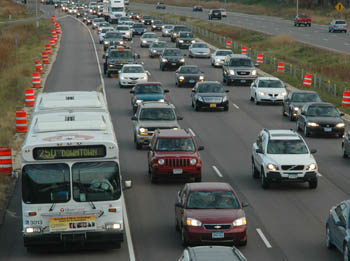I know I said I wasn't going to post during my vacation, but I thought you'd be interested in this new report from the FHWA, and, perhaps more notably, the Republican reaction to it. The agency just submitted a report to Congress on the use of highway shoulder lanes as traffic lanes. (It's not online, or we'd link to it.) Update: here it is. [PDF]

The report, written by the FHWA and the Texas Transportation Institute, recommended setting clearer agency guidance on using shoulders for traffic. Incoming Transportation Committee Chair John Mica (R-FL) heralded the idea as a way to "achieve cost savings by better utilizing existing highway capacity." He emphasized that he's not interested in "paving over America’s landscape."
Expanding the existing footprint of our nation’s highway system can be costly and time consuming. Our interstates have become parking lots and this report confirms low cost and effective solutions exist to relieve congestion. By using existing highway footprints and right-of-way, States will have another effective, low cost means to reduce congestion and enhance mobility.
Encouraging words, to an extent. But the FHWA report, while acknowledging potential benefits for alleviating traffic congestion, says the safety impacts of opening shoulder lanes to traffic are unclear. Europeans have gained safety benefits by utilizing shoulder lanes, the report says, but "the shoulder use is only a part of a much larger investment in ATM [Advanced Traffic Management] technology and resources to manage them."
In the U.S., where they have been studied, safety impacts have been negative. "There have been longer incident clearance times in areas that don’t have shoulders available to move incidents off the highway. Also, responders don’t have the benefit of traveling the shoulder to reach the incident scene."
The Michigan Trails and Greenways Alliance, in their report on Reasons for Highway Shoulders and Urban Bike Lanes, reminds readers, "These were often referred to as 'safety shoulders.' There are good reasons for this term." In addition to driver safety, of course, the Alliance is also concerned with maintaining a space on the side of the road for bicyclists.
The FHWA, and the Republicans on the Transportation Committee, are particularly interested in the use of shoulder lanes for buses. "The use of buses on shoulders has generally significantly benefited transit trip time reliability in those corridors where it has been implemented," the report says. "There have been shoulder use projects that have shown bottleneck relief at spot locations."
The language used throughout the report refers to the "temporary" and "interim" use of shoulders for traffic. But what is the long-term solution? Despite Mica's aversion to "paving the landscape," isn't that just what will happen when the shoulder lanes become as congested as the travel lanes and the roads become less safe for not having a place for drivers to pull off?





